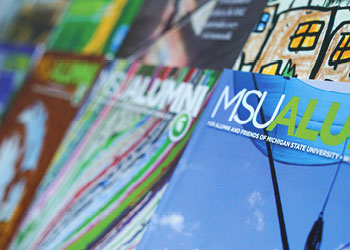People: Clifton Wharton Jr.

CLIFTON WHARTON JR.: NO FOREIGNER TO POLICY
When President Bill Clinton named former MSU president Clifton R. Wharton, Jr., as the Deputy Secretary of State, some columnists decried his lack of experience in foreign affairs. 'A friend of mine called me after reading that column,' he recalls. 'He said, 'You know, they just wiped out 22 years of your life!''
Indeed, to those who know Wharton--the only nominee for the post in history who boasts experience in foreign economic development--the charge sounded ludicrous. On January 22, at his Senate confirmation hearing, he set the record straight. The day he graduated from Harvard University in 1947, Wharton recalled, he was inspired by commencement speaker Gen. George Marshall, whose plan for postwar Europe involved idealistic principles. '(I) resolved on the spot to dedicate (myself) to these principles,' he told the senators.
Accordingly, Wharton earned his master's degree at Johns Hopkins School of Advanced International Studies, where he majored in international studies with an emphasis on Latin America. That, noted Wharton, 'eventually led to five years of work on assistance programs in Venezuela, Brazil, and Costa Rica in association with Nelson Rockefeller.'
Later, while earning his doctorate at the University of Chicago, he was mentored by Nobel Laureate economist Theodore Schultz, who was evaluating technical assistance in Latin America. Wharton's dissertation focused on the impact of technical assistance on agricultural development in Brazil.
From 1957 to 1970, Wharton continued to feel the excitement of George Marshall's vision, as well as President Truman's 'Point Four' program, which extended Marshall's concept to the Third World. He offered his service to the private, nonprofit Agricultural Development Council headed by John D. Rockefeller, III. During that period he and his family spent six years in Singapore and Malaysia and travelled regularly to Thailand, Laos, Cambodia and Vietnam.
Thus, before assuming the MSU presidency in 1970, Wharton spent 22 years achieving concrete results abroad through technical assistance and foreign economic development. Wharton's international work did not end when he took charge of MSU--a megaversity boasting one of the world's largest international programs and featuring scores of projects based in developing nations--many funded by the Agency for International Development.
In 1978, he became chancellor of the State University of New York system and in the next nine years launched many key initiatives to enhance SUNY's international commitments. In 1987 Wharton became chairman and CEO of TIAA-CREF, the largest private pension fund in the world with assets of $112 billion.
Since 1970 Wharton was involved in many overseas forays. He served as chairman of Congress' Food Advisory Committee, as a member of President Carter's Commission on World Hunger; and as first chairman of AID's Board for International Food and Agricultural Development. He has also served as a longstanding member of the Overseas Developpment Council and trustee of the Council on Foreign Relations. He also served as a trustee of the Rockefeller Foundation for 17 years, as chairman for five.
Give President Clinton credit for identifying Wharton, whom he met while both served in the Business and Higher Education Forum created by the American Council on Education. More recently, Wharton participated in Clinton's economic summit in Little Rock, AK, and made a tremendous impression.
There is an irony in Wharton's new ascension. Wharton's father had served in the foreign service for 40 years and was the first black career officer to be appointed a U.S. ambassador. 'My one regret is that he couldn't be in the audience today,' Wharton told the senators. 'If he had been here, he'd probably be nodding and saying, 'Well, son, you certainly took the long way around. It was about time you took my advice.''